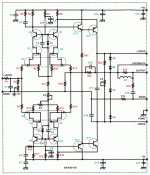I am working on a power amplifier.
Cascoding of VAS lower distortion considerably.
When do we cascode and when not?
Have you cascoded? VAS? Output? Examples?
Drawbacks of cascoding?
I'd like to know more of this.
Cascode ... is this all heaven to do?
🙂 Stefan
Cascoding of VAS lower distortion considerably.
When do we cascode and when not?
Have you cascoded? VAS? Output? Examples?
Drawbacks of cascoding?
I'd like to know more of this.
Cascode ... is this all heaven to do?
🙂 Stefan
Cascoding eliminates the Miller effect. It is often used in RF amplifiers. Cascoding also increases the gain.
The downside is that less voltage swing is available.
Ed
The downside is that less voltage swing is available.
Ed
I am working on a power amplifier.
Cascoding of VAS lower distortion considerably.
I guess it's because the non-linear junction capacitance of the transistor is no longer in parallel with the Miller compensation capacitor, but that's just a guess.
When do we cascode and when not?
Whenever it has a big enough advantage to do so. For example, to improve high-frequency behaviour, increase gain, protect a low-voltage device against excessive voltages. A disadvantage it that it costs some headroom and some extra transistors.
Baxandall cascode works very well for cancelling Cob, and will also compensate for the base current of the cascoding device (Q58).
The small bjt can be operated at Vce=0.6V if you choose the right part.
(It's also called Hawksford cascode).
View attachment 1161283
Thanks.
🙂 Stefan
You are right, but only if the load is comparable to the output impedance of the JFET.A common emitter stage with a cascode on top has a higher voltage gain and transimpedance gain than one without, because of the reduction of the influence of the Early effect.
I don't understand where that reference to a JFET comes from, but indeed, for a stage with a load impedance that is small compared to the internal resistance of the amplifying device, cascoding won't increase the gain noticably. It could even reduce it by a very small amount.
The high frequecy open-loop gain is increased - in a typical VAS at high frequency the closed-loop gain is set by the compensation capacitor but the more open-loop gain available the more linear the closed-loop response will be (assuming the capacitor is linear!)But cascoding does not increase the gain.
Sorry, I was referring to the schematic in post #3. And, yes, in a typical VAS, cascoding gives good results, both regarding bandwidth, distortion and gain.I don't understand where that reference to a JFET comes from, but indeed, for a stage with a load impedance that is small compared to the internal resistance of the amplifying device, cascoding won't increase the gain noticably. It could even reduce it by a very small amount.
Nelson Pass has written a paper on Cascode in amplifiers:
https://www.passlabs.com/technical_article/cascode-amp-design/
He also has a good example figure.

🙂 Stefan
https://www.passlabs.com/technical_article/cascode-amp-design/
He also has a good example figure.
🙂 Stefan
Removing the cascode will affect bandwith, phase shift, produce different harmonic profile and may increase gate leakage with all of it's related issues. It will behave and sound differently but should hopefully result in nothing fatal.Yes, in the circuit in post #3 there is no advantage using cascode for JFET.
- Home
- Amplifiers
- Solid State
- Cascode. When to cascode and when not. Your experience? Examples?
